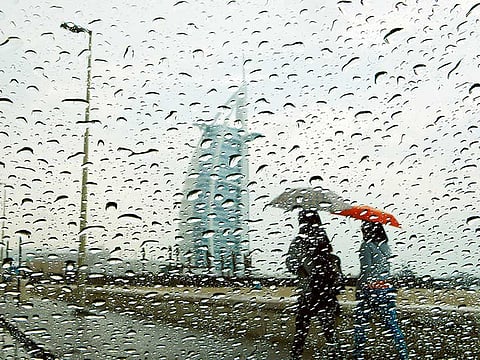Unstable weather to continue till Tuesday
Moderate to heavy rain, accompanied by hail, fell on scattered parts of UAE on Monday

Dubai: Don’t ditch your umbrellas just yet as chances of rain still persist over scattered parts of the country on Tuesday but rainclouds will move northwards, the national weather bureau said.
The first showers of the year saw moderate to heavy rain, accompanied by hail, over scattered parts of the country on Monday due to unstable weather that will affect the country until Tuesday.
“This instability in the weather is because of the low pressure coming from the Mediterranean region, which intensified and affected the whole UAE and the region’s weather. It’s a dynamic system, which comes from the west to the east,” a weather forecaster at the National Centre of Meteorology and Seismology told Gulf News.
Rainwater flooded some low-lying areas in the country, as the maximum rainfall was recorded in Jebel Jais at 46.4mm at 11am.
“Chances of rain still persist until early morning on Tuesday over the northern area of the UAE. Maximum wind was recorded at 65km/h on Monday. This will persist for the coming two days, on Tuesday and Wednesday.”
Hail was reported in Ajban, Swehan and Nahil in Abu Dhabi. Some residents took to social media to post their images of what to them appeared as snow cover but the weather forecaster clarified that the particles were hail and not snow.
The sea remains off limits to the public. The maximum height of waves on Monday was recorded at 12 feet offshore in Umm Al Dakh, 25km northwest of Abu Dhabi.
“We’re expecting the sea to be very rough over the Arabian Gulf and moderate to rough by evening over the Sea of Oman. We’re expecting visibility to be a little bit lower because of the fresh winds that blow sand over some areas in addition to the intense rainfall.”
The forecaster said the rainy weather is to be expected at this time, although the amount of rainfall varies.
“This is a usual condition during winter but the cycle varies from year to year. Some years we have more rain, some years we have less rain.”
The upper air temperature was -17 degrees Celsius at 18,000 feet, which affected surface air, causing it to drop by five degrees. The maximum temperature in Abu Dhabi is expected to be 21C and the minimum 14C. Similar temperatures will persist in other areas.



